Emergency Dentist Worcester
Urgent Oral Care When You Need It

Should you have a dental emergency, you’ll need to act quickly. Delaying your care too long will make the situation worse. Luckily, you can count on Dr. Damerji and our dental team. We’re always on call, ready to assist, and reachable at any time. Just contact our office to get the emergency dentistry in Worcester that you need. That way, you’ll find fast relief and have your grin repaired in no time. See for yourself by reading below or by booking a same-day visit.
Why Choose Burncoat Family Dental for Emergency Dentistry?
- Same-Day Appointments Available
- Attentive & Caring Dental Team
- Dental Insurance Friendly & Flexible Financing Welcome
How We Treat Dental Emergencies

Are you facing your first dental emergency? If so, don’t panic; we’ll walk you through the treatment process. To that end, here are four things to expect from your urgent dental visit:
- A Same-Day Visit – We’ll book you for the earliest possible visit. In fact, Dr. Damerji will see you either the same or the next day. If you leave a voicemail at our emergency number, Dr. Damerji will usually return the call within an hour.
- An Emergency Exam – At the start of your visit, our dental team will perform an emergency oral exam. Doing so helps us find your problem’s source and how to relieve your pain.
- A Review of Findings – After the exam, we’ll share our findings with you. We’ll then suggest suitable procedures and draft a treatment plan.
- Needed Dental Care – With the treatment plan drafted, our dental team will solve your oral issue. Whether you need a filling, crown, or something else, we’ll get your smile back on track.
The Most Common Dental Emergencies
While they do differ from each other, many dental emergencies are fairly common. These sorts happen more often than the others. Should you face one, you really ought to visit us. Our dental team knows how to handle typical dental emergencies. In particular, give us a call if you suffer any of the following:
Understanding the Cost of Emergency Dentistry
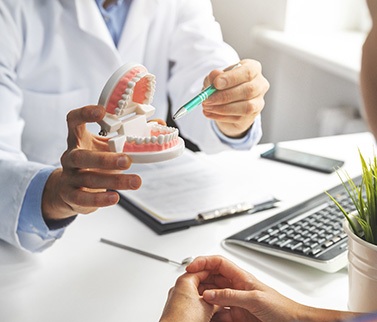
Once their pain is alleviated and their healthy smile is restored, many patients start to worry about something else: the price. Don’t worry – our Worcester dental team is here to help you navigate the financial side of your treatment as well. Below, you will find some helpful information on the cost of emergency dentistry, but don’t hesitate to get in touch with us if you have any questions!
Why Every Dental Emergency is Different
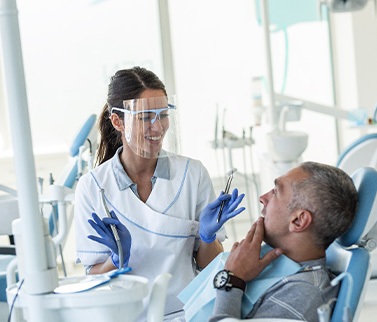
The reason the cost is different is because each situation is different! For instance, one patient may visit us because of tooth pain, and the next may come in for a same-day appointment because they knocked out a tooth. In fact, even if two patients visit us with the same symptoms, they may need two completely different treatments to restore their healthy, pain-free smile.
Does Dental Insurance Cover Dental Emergencies?
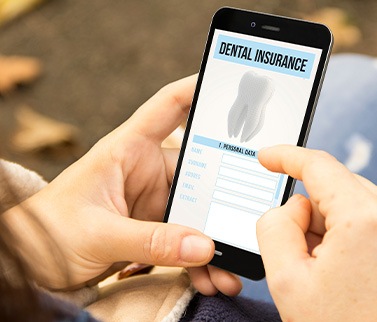
If you have dental insurance, it’s worth taking a look at your plan or calling your provider to learn more about your benefits. Of course, our team at Burncoat Family Dental is also here to help! We work with Blue Cross Blue Shield, Delta Dental (Premier and PPO), Aetna, MetLife, and several others. Plus, we can handle the paperwork on your behalf to make the process of utilizing your benefits much less stressful. In short, there’s a good chance that your dental insurance can lower your out-of-pocket expenses, so it’s worth reviewing your coverage and asking us for help, if you need it!
Other Options for Making Dental Emergencies Affordable

If you don’t have dental insurance at the moment, that’s okay – that’s just one financial solution. Another one is CareCredit, which prevents you from having to pay for the entire cost of your care at once. Instead, you can choose one of their payment plans and space out the price into smaller, more manageable installments. We also offer our patients periodic specials, like a $99 emergency visit, so don’t hesitate to take a look at the “Special Offers” page on our website or ask us about our latest promotions when you call to schedule your appointment!
How Taking Care Of Your Smile Can Save You Money

Taking good care of your smile won’t just keep your teeth white and your breath fresh; it will also prevent common dental problems, like cavities. So, if you want to keep your teeth and gums happy and healthy, make sure that you:
- Brush and floss consistently
- Get a dental checkup and teeth cleaning biannually
- Don’t over-indulge on foods and drinks with added sugar
- Wear a mouthguard if you play sports or grind your teeth at night
- Quit unhealthy habits, like biting your nails
If you ever have any questions about the price – whether it’s about essential restorative care or a routine checkup – don’t hesitate to reach out to us! We don’t want you to stress about any of your visits; we want you to have the positive experience you deserve at each one.
Keys to Preventing Dental Emergencies
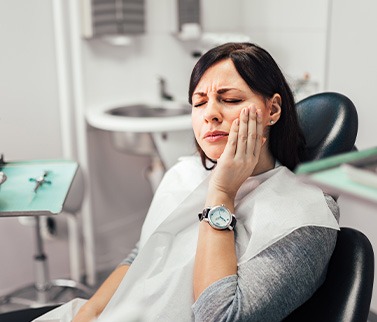
There are many reasons you may experience a dental emergency. But while not all of them can be avoided, some can be easily prevented with a few simple lifestyle changes. From regular brushing and flossing to protecting your teeth from accidental injury during sports, safeguarding your smile doesn’t have to be difficult. If you’re interested in learning how to avoid the dental chair outside of your regularly scheduled exam and cleaning, keep reading!
Visit Your Dentist Regularly
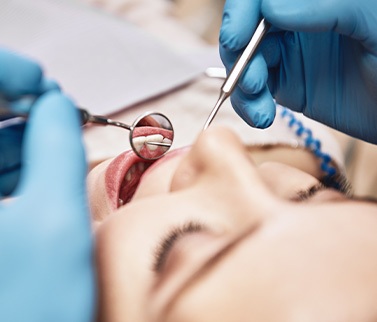
You know the way your teeth feel when you leave Burncoat Family Dental? That smooth sensation you can only get from your semi-annual exam and cleaning is just one benefit of visiting Dr. Damerji and Dr. Alyassi. That’s because when you see us regularly, we can easily screen your teeth and gums for many oral health problems that you could be missing on your own, making it less likely that you’ll need more extensive work down the road, and preventing a potential dental emergency.
Maintain Good Oral Hygiene Habits at Home

In addition to regular visits with Dr. Damerji and Dr. Alyassi, it is important that you care for your teeth and gums at home. This can be done by brushing your teeth twice a day and flossing at least once a day, not smoking, and notifying your Burncoat Family Dental team if you notice any unexpected changes in your mouth.
Watch Your Diet

Diets high in sugar and carbohydrates can not only cause problems with your overall health, but they can also harm your oral health, too. That’s because the bacteria that causes cavities (s. mutans) thrives on sugar and carbohydrates that linger in your mouth after eating. Conversely, eating a diet high in lean protein, fresh fruits and vegetables, nuts and seeds, and dairy products can help keep your teeth and gums healthy and strong and your body functioning properly.
Wear a Mouthguard
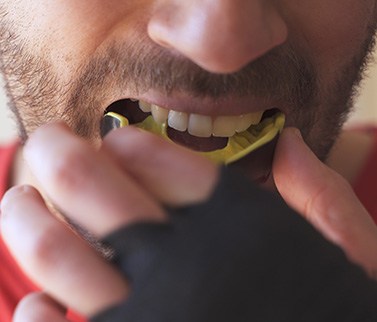
Whether you grind your teeth (bruxism) or play sports, it’s important to wear your gear as prescribed by Dr. Alyassi and Dr. Damerji. This will help prevent your teeth from accidental damage such as breaks, cracks, or being knocked out while at rest or at play. If you’re using a storebought guard that is uncomfortable or awkward to wear, speak to your dentist about having a custom guard made. These are made to fit your mouth perfectly, so you’re more likely to wear them and keep your teeth safe!
Use Tools, Not Teeth to Open Packaging
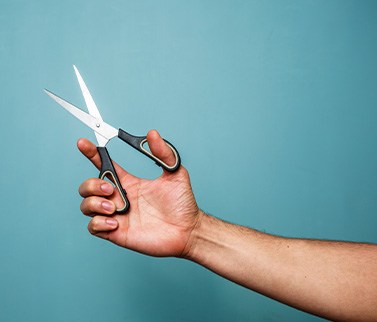
Sure, your teeth might work to open a stubborn piece of packaging if there are no scissors nearby; however, this can cause them to chip, crack, or fall out if you’re not careful. While it may be less convenient, taking an extra moment to get a proper tool to open it could save your smile!
The same goes for biting your fingernails: if it’s not food, don’t use your teeth on it!
Dental Emergency FAQs
How Do I Know if My Toothache is an Infection?
If your tooth feels sore, your gums surrounding the tooth are swollen, or you’re dealing with persistent sensitivity, then there’s a good chance that the root of the problem is an infection. That said, the only way to know for sure is to schedule an emergency exam. We recommend contacting our Worcester dental team when you first notice that something is wrong so we can pinpoint the issue and address it ASAP.
Should I Visit the Emergency Room First for Dental Emergencies?
If you are experiencing potentially life-threatening symptoms, like uncontrollable bleeding or trouble swallowing, then you should go to the ER immediately. If, on the other hand, you’re dealing with a painful toothache, a loose restoration, a knocked-out tooth, or something similar, then your first call should be to our Worcester dental office. We’re open as early as 7:30 AM during the week, and we offer lunchtime hours as well. So, there’s a good chance that we’ll be able to schedule an exam on the same day.
Can I Pop a Dental Abscess on My Own?
You should NOT pop a dental abscess on your own. Not only will this expose your mouth to more bacteria, but it won’t address the root of the problem. The best thing to do is call us when you notice that there is a pimple-like bump on your gums. At your appointment, we will open and drain the abscess, removing all of the pus in the process. Then, we will determine if further care is needed to address the infection, like root canal treatment or a tooth extraction.
Should I Worry About a Chipped Tooth If It Doesn’t Hurt?
If your chipped tooth doesn’t hurt, you might assume that scheduling an appointment isn’t necessary. However, it’s possible that the tooth will break further or an infection will develop, and we want to prevent that from happening. So, even if you aren’t experiencing any abnormal symptoms, give us a call so we can conduct an exam within the next couple of days.
Is It Safe to Repair Dentures with Superglue?
The chemicals in superglue can be toxic, so don’t use this household adhesive to try and repair your dentures. Instead, give us a call to share what happened. Once we know a little more about your situation, including how severe the damage is and how old your restoration is, we can determine what the next best steps are.
What If I Can’t Afford Emergency Dentistry?
Receiving a large bill you weren’t expecting can be anxiety-inducing, which is why many patients try to take the “wait and see” approach. However, this only ends up hurting your wallet; the longer you wait, the worse the root of the problem will get. So, if you want to save your smile and your wallet, the best thing to do is schedule an emergency exam when you first notice that something is wrong, like it hurts to chew your food. At your appointment, we will determine the root of the problem, create your custom treatment plan, and review the financial solutions available so you don’t have to stress about the cost.
I Need a Checkup & Cleaning I am Worried About Bleeding Gums I Have a Cavity or Broken Tooth I am Missing One or More Teeth I Want to Enhance My Smile I Want a Straighter Smile I Have Pain in My Jaw View Our Services
